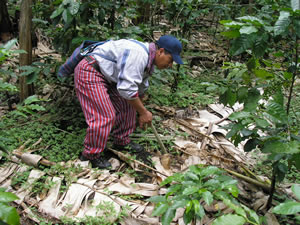
Among the UK commitments at the Rio Earth Summit in 1992 was the establishment of the Darwin Initiative, which promotes conservation in countries rich in biodiversity, but poor in economic resources. Since its establishment it has financed over 700 projects in 155 countries, and a few of these have been implemented by the Natural Resources Institute (NRI), including most recently a new project entitled: "Agroforests: A critical resource for Megadiversity in Guatemala". As described here, a tour of the areas where the project will work shows the magnitude of changes since 1992.
At the end of the last century the Polochic Valley and the lower slopes of the Pacific volcanic chain of Guatemala were covered with coffee plantations under the shade of tropical forest trees rich in biodiversity. According to studies in the 1990s by the Smithsonian Migratory Bird Centre (SMBC), the biodiversity in these coffee agroforests was crucial for a great many wildlife species, especially wintering birds from North America.
In the mid 1990s, coffee prices crashed, with a severe decline continuing into in the early 2000s, leaving thousands of coffee producers in debt and hundreds of thousands of workers and small farmers with no income. A study in 2004 led by Jeremy Haggar, now at NRI, showed that following this price drop, there had been a substantial conversion of coffee plantations to rubber, pastures and citrus, and that habitats had been lost for the flora and fauna that lived in the forest-shaded coffee.
Today only a few farms in the Boca Costa region of Guatemala maintain the traditional forest-shade coffee, most of these in the Palajunoj region above the city of Retalhuleu. Here several coffee estates and small-scale producer associations have declared their land as Private Nature Reserves to help protect the remnant forests and coffee agroforestry.
In the Polochic Valley, the farms where SMBC conducted their studies have now eradicated most of their coffee. However, indigenous K'chi communities maintain coffee production high up on the steep slopes of the Sierra Las Minas in the buffer zone of the Biosphere Reserve.
Last month we met with the farmer associations in these areas, together with our partners in Guatemala; the National Coffee Association, the Foundation for the Defence of Nature and the University of Valle. It was found that farmers were interested in improving access to markets that recognise the contribution of their farm management to biodiversity value. They also wished to determine the economic value of the environmental benefits they are providing. Over the course of the next 3 years the project aims to demonstrate the value of shaded coffee for biodiversity, and to support farmers in receiving recognition for this value.
We hope that the agreements of Rio+20 will provide a global framework to develop the pathways for rural communities to improve their livelihoods through the sustainable management of the ecosystems and the biodiversity they conserve.

